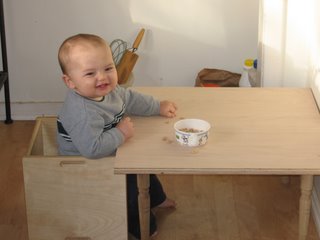Sleep: 11 Months
A recent post to my earlier sleep entry has motivated me to finally put down some thoughts on this subject. I must confess, it is one that I feel I hesitant to write about for many reasons. First, I am often frustrated with the way sleep occurs in our household. Second, I am unsure how well matched my theories and practices regarding sleep are (and I am continually questioning what those theories are). All the same, it may be beneficial both to me and to other parents practicing Montessori to reflect on what's happening.
Unfortunately, Montessori's writings on sleep are limited (unless I'm not looking in the write places). I'll briefly summarize my interpretation of what she has written on the subject: parents too often force their children to sleep for their own benefit. Given the time period in which she's writing, I would guess that this was likely true, but is probably not the biggest problem facing parents today - or at least those who would be reading this blog.
Earlier, I wrote that I believed parents should focus on helping children to become independent in their sleep habits. I still believe this is true. The big question, then, is how do we do this?
The post that prompted me to write this reflection mentioned a very familiar scenario - it's naptime. Or better yet, it's probably beyond naptime. Baby/toddler is fussy, easily frustrated, rubbing eyes, lacking coordination - all the classic signs of tiredness. Yet he just won't settle down long enough to sleep. What to do? The writer then described something we've tried ourselves - put the child in bed, leave the room, return when he's banging on the door and crying, put him back in bed, repeat. And repeat. And repeat.
Perhaps this method would have worked if my husband and I had the stamina to continue it. However, in my mind, something was missing. If it was really in his best interest to take a nap at that time, what would have happened if he had played instead of banging on the door? Weren't we really communicating that we didn't care what he did as long as he didn't come to the door crying?
I guess I've decided that, if I really want to communicate that it's time to sleep, I need to be by his bed. This is in line with my thinking that if he's exhausted and having trouble stopping his body from moving, he may need my help. While I'm there, my goal is to be "removed" - if he's lying down and he's quiet, I don't make eye contact and I try to be a still as possible. Other times, he might need me to pat his back or sing to help him settle in. The really tough times, he'll repeatedly sit up and I'll gently lie him back down and say something like "It's time to rest" or "Your body is tired." Still other times, I'll realize that I have jumped the gun and he really isn't ready to sleep. On the really good nights where we've gone through our bedtime routine or we've hit him at exactly the right moment, I can lay him down and leave the room while he's still awake. There's quite a range.
I feel okay about setting a limit around sleep because I'm careful to only do it when I'm certain that he's very tired or when our needs for sleep and his safety depend on it (like at 2am last night!). I also trust that independence will come with time and that it is fairly normal for him to be able to get himself to sleep some time but not others. Though I know my philosophies and techniques will probably change as time goes on, I feel fairly comfortable with where we are right now and the strategies we've chosen to help all of us meet our needs for sleep.
Labels: baby, Montessori bed, sleep, sleep methods, toddler

